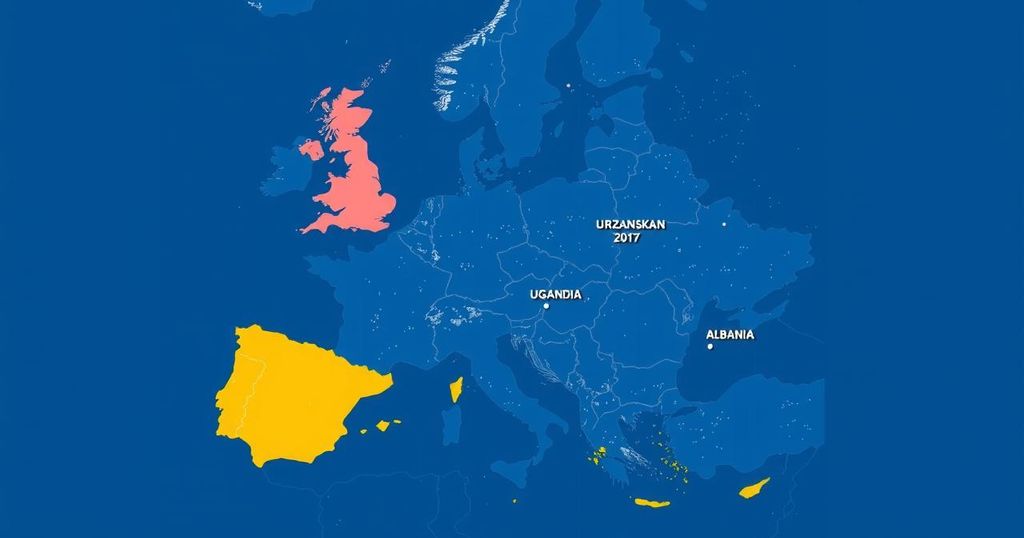The EU’s Search for Solutions: Targeting Uganda, Uzbekistan, and Albania for Migrant Relocation
The European Union seeks countries to host unwelcome migrants, considering proposals for return hubs similar to a past British initiative. Countries like Uganda, Italy, and Uzbekistan are discussed as potential destinations for migrants denied asylum, amid concerns about legal, ethical, and operational implications of these strategies. The rising influence of anti-immigration forces within the EU highlights shifting dynamics in asylum policy as member states confront ongoing refugee challenges.
The European Union (EU) is actively seeking alternatives for relocating unwanted migrants following the endorsement by its top leaders of innovative strategies to address asylum seekers. Among these proposals are the establishment of “return hubs,” reminiscent of a prior British initiative aimed at deporting unsuccessful asylum applicants to Rwanda. Furthermore, there is discussion surrounding the relocation of individuals granted asylum to designated third countries. Poland’s Prime Minister Donald Tusk has gained implicit EU support for the suspension of asylum rights in reaction to an influx of border crossings from Belarus. European Commission President Ursula von der Leyen remarked that countries “have to be able to take measures that are temporary and appropriate.” The late-night summit agreements reflect a strengthening influence of anti-immigration sentiments in Brussels, particularly following significant hard-right electoral successes in Austria, Germany, and the Netherlands. However, concerns persist regarding the operationalization of these policies, especially considering existing laws that oppose placing individuals in situations where they may face conflict or abuse. At present, no specific destination has been finalized for the so-called return hubs. In an intriguing development, the Dutch government has tentatively proposed Uganda as a viable option, with Italy advocating for the return of displaced persons to Syria. The German government is exploring conversations with Uzbekistan regarding the potential acceptance of repatriated refugees, contingent upon offering advantageous terms for migrant workers. Chancellor Olaf Scholz has faced calls from the opposition to include Tunisia, Morocco, and Algeria on the list of safe countries. Additionally, Italy’s initiative to process asylum applications at a facility in Albania has attracted attention in the European context, although it encountered difficulties with the health and age verification of some initial migrants sent there. EU leaders are advocating for a coordinated approach to curtail irregular migration through enforcement of existing regulations, stating their commitment to facilitating speedier returns, a term often representative of deportations. Notably, Prime Minister Dick Schoof of the Netherlands highlighted Uganda as a prospective destination for migrants denied asylum, asserting the rationale that those individuals could be returned to a designated hub before being sent back to their home nations. Currently, only 20% of migrants denied residency in the EU are deported, a statistic that underscores the challenges faced in implementing these proposed solutions. The response from Uganda has been mixed; although Foreign Minister Jeje Odongo indicated openness to discussions, a junior minister raised concerns, emphasizing Uganda’s existing responsibilities as a host to 1.6 million refugees from neighboring conflict zones. While Uganda’s economy has improved and development indicators have shown progress, the country still faces significant scrutiny regarding its human rights record. The UK had previously attempted a deal to transfer failed asylum seekers to Rwanda, which was ultimately abandoned by the new administration after criticism regarding its feasibility and cost-effectiveness. While EU officials differentiated between Britain’s prolonged deportation plans and their offshore asylum processing ideas, von der Leyen has expressed interest in further developments of return hubs beyond EU borders. Afghans constituted the second-largest group of asylum seekers in the EU last year; however, challenges exist regarding the deportation of individuals to Afghanistan, particularly given the EU’s lack of recognition of the Taliban regime. Deportations have occurred selectively for Afghan nationals with criminal convictions. Working with Uzbekistan has emerged as a potential strategy for addressing both illegal migration and the situation of Afghan refugees, though the country currently accommodates a limited number of them. Some EU nations are also investigating the possibility of repatriating individuals to Syria, despite previously frayed diplomatic relations with the Assad administration. While the right to asylum remains a paramount subject within the EU, its validity is not absolute, particularly with proposals for stricter asylum policies underway. Italy’s recent agreement anticipates the relocation of up to 3,000 male migrants monthly to Albania, where their cases will be adjudicated remotely, further entailing a financial commitment from Italy to Albania. Other EU states, including Germany and non-EU Britain, have expressed interest in the Albanian arrangement, which indicates a broader trend towards collaborative efforts in managing migration issues across Europe.
The article sheds light on the evolving landscape of migration management within the European Union. It underscores the bloc’s increasing inclination towards alternative solutions for handling asylum seekers in the face of rising anti-immigration sentiments and pressures from member states experiencing significant migrant influxes. The background of these developments includes recent political shifts within the EU, the impact of electoral outcomes in various countries, and ongoing humanitarian challenges associated with large-scale migrations from regions such as Afghanistan and Syria.
In summary, the EU’s exploration of return hubs and the relocation of migrants reflect a strategic pivot driven by growing anti-immigration sentiments among member states. As negotiations with various countries progress, the operationalization of these initiatives must navigate complex legal, ethical, and humanitarian challenges. The ongoing discourse emphasizes the necessity of balancing national interests with the commitment to uphold the right to asylum, which remains a foundational principle within the EU framework.
Original Source: www.thenationalnews.com




Post Comment